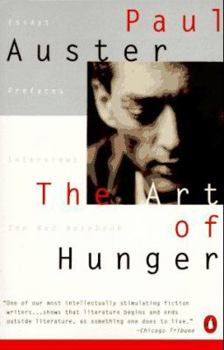The Art of Hunger: Essays, Prefaces, Interviews, the Red Notebook
Select Format
Select Condition 
Book Overview
In this astonishingly acrobatic work, Paul Auster traces the compulsion to make literature--or art--through essays on Franz Kafka, Samuel Beckett, Paul Celan, Laura Riding, Knut Hamsun, John Ashbery, and other vital figures of our century. In a section of interviews as well as in the revelatory ?The Red Notebook,? Auster reflects on his own work: on the need to break down the boundary between living and writing; on the use of certain genre conventions...
Format:Paperback
Language:English
ISBN:0140171681
ISBN13:9780140171686
Release Date:January 1993
Publisher:Penguin Group
Length:352 Pages
Weight:0.55 lbs.
Dimensions:0.7" x 5.0" x 7.7"
Customer Reviews
2 ratings
Auster's Austerities
Published by Thriftbooks.com User , 15 years ago
This collection of essays, interviews, and prefaces explores the theme of "Hunger" (whether spiritual or artistic) in modern fiction, poetry, and art. Auster's essays celebrate (or provide a general overview of) works (or careers) of important artists, such as Knut Hamsun, Samuel Beckett, John Ashbery, William Bronk, Georges Perec, and Franz Kafka. Kafka is the subject of two essays in the book, and his story "A Hunger Artist" is for Auster a sort of template or emblem for the seriousness of the modern artist's task. Hunger, for Auster, seems to be a kind of rebellion, a reluctance to collaborate with the failures of Western culture, and yet it is, at times, both purifying and self-destructive. Auster does not present simple resolutions regarding this predicament. Rather, he appreciates the noble struggle each of these artists has waged. And though Auster seems to admire each of the figures he writes about, he is not uncritical of them. His piece entitled "Kafka's Letters" reveals his deep admiration of Kafka, yet Auster does not present the Czech author as a "literary giant", but as a man--an amazingly insightful, intelligent, generous man, who, despite his troubled inner life, managed to remain committed to his art and to his friends until his excruciating last moments. The piece exalts Kafka by humanizing him, deepening our admiration of both Kafka and Auster. "The Art of Hunger" ends with "The Red Notebooks," an interesting meditation on coincidence, which includes fascinating anecdotes from Auster's own life. In all, this is a satisfying collection of prose pieces that fans of Auster's fiction (and/or fans of the artists discussed in the book) should thoroughly enjoy.
Blandness blinded by brilliancy
Published by Thriftbooks.com User , 27 years ago
The book is in many ways a fascinating voyage into and around the thoughts of Paul Auster and the processes that take place when he writes. Unfortunately, too much space is spent on retelling small coincidences, which lose their power and magic after being repeated, they become bland, everyday events. The interviews make it all worth while though. Austers eloquence and openness make for informative reading.






